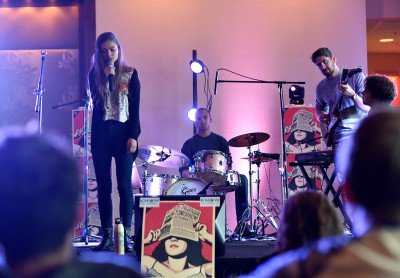
Speakers at the Know Tomorrow Music and Climate Festival repeated an essential phrase over and over — “the science is clear.” Festivalgoers gathered at The Ritz-Carlton on the Boston Common on Friday were not present to convince anyone that climate change is real, but rather to discuss and rally for solutions to the problem.
Know Tomorrow is a campaign that was started this summer. It unites college students nationwide in raising awareness about and pushing for action on climate change. The campaign, backed by Al Gore’s Climate Reality Project, pairs schools with professors, scientists and celebrities to promote its cause.
Emma Marshall-Torres, a junior in Boston University’s College of Arts and Sciences, joined other Boston college students to plan the music festival. She emphasized Know Tomorrow’s goal to unify diverse organizations and spread awareness of possible climate change solutions that the average person may not know about.
“We want to kick off additional movements and bring together a variety of different groups to show that environmentalism is about more than recycling,” Marshall-Torres said. “It’s really about things like sustainable energy.”
Although many speakers at the festival varied in their solutions to climate change, a major theme of the night was bringing about the end of fossil fuels.
Students for a Just and Stable Future, a Boston University student group, focused on this specific issue at the festival and sought to promote its campaign for BU to divest from fossil fuels. Rachel Eckles, a junior in CAS and member of the group, praised BU’s actions to promote sustainability on campus, but said that the school contradicts their sustainable actions by continuing to invest in fossil fuel companies.
“We think it’s hypocritical that they [BU] want fossil fuels to succeed while also doing great things like founding the sustainability office,” Eckles said.
Shana Gallagher, co-director of the festival, said that she does not think that divestment is enough. Speaking before the crowd, Gallagher expressed that while divestment is definitely a worthy cause, it is too easy for institutions to delay or ignore calls for divestment due to its “financial controversy.”
Instead, Gallagher proposed that students shift their efforts from rallying against divesting to encouraging carbon pricing. This would force companies to pay per metric ton for the carbon dioxide they release into the atmosphere, either through a tax or required permit purchase.
“If corporations had to pay for the pollution they create, instead of shifting the burden to us, we’d see a fast transition to clean energy and a huge reduction in carbon emissions,” Gallagher said.
Several groups present at the festival shared their efforts to make sure that carbon never gets released into the atmosphere in the first place. Both Biodiversity for a Livable Climate and the New England Farmers Union promoted sustainable farming practices such as no-till farming, rotational grazing and cover crops. These practices result in carbon sequestration, ensuring that more carbon stays in the soil rather than escaping into the atmosphere.
Roger Noonan, president of the NEFU, expanded on the widespread benefits of sustainable farming practices during his speech.
“These carbon sequestering practices not only mitigate, or reduce, climate impacts, but they also provide the soil resiliency to withstand drought, withstand excessive moisture and create more healthful and productive soils,” Noonan said.
Divestment, carbon pricing and carbon sequestration, as was constantly stated throughout the festival, are all effective ways to reduce the impact of fossil fuels and potentially lead to their demise. However, this brings up the important question of what’s going to replace these fuel methods.
Yeloha, a Boston-based company that was present at the festival, is on a mission to give everyone the chance to lower their fossil fuel usage. By setting up a digital subscriber system to solar panels that the company installs on roofs for free, Yeloha makes it possible for everyone to have access to clean and renewable solar power.
“Now, even if you don’t own your home or have a roof compatible with solar or a lot of money, you can still use solar power,” said Joel Gamoran, regional director of Yeloha.
Massachusetts Sen. Ed Markey said in his speech that renewable energy sources such as solar and wind are growing industries in the U.S., despite coal and oil companies’ attempts to hinder them. Markey also said that 130,000 megawatts of solar and wind power combined will be deployed in the U.S. by the end of the next year.
“This generation, this green generation,” Markey said, “is going to make it possible … to say that children have to look to history books to find that there ever was an era that fossil fuels were the way we generated energy on our planet.”


























































































































